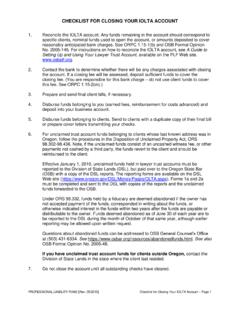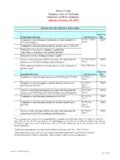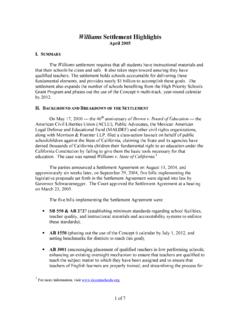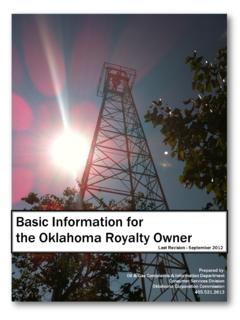Transcription of 2017 LEGISLATION ALERTS Civil Procedure and …
1 ISSUE 133 | JANUARY 20181 LAW UPDATES2017 LEGISLATION ALERTSC ivil Procedure and LitigationSB 131 (Ch. 240) Remote Location TestimonySB 131 revises the rules for the use of what was previously referred to as telephone testimony. Remote location (formerly telephone) testimony from parties and witnesses in hearings and trials in Civil cases and in actions under ORS chapter 419B continues to be available if requested by motion at least 30 days (or less for good cause shown) prior to the hearing or trial. However, ORS has been reorganized and updated with some small changes. There seems to be a preference for testimony that allows the party or witness to be viewed, as opposed to merely heard, as is the case in a telephone connection. See section 1 of SB 131 (new ORS (4) and new ORS (8)(b)(C)). A compelling need to allow remote location testimony continues to be required if the testimony is in a jury trial (ORS (4), now ORS (5)).
2 SB 131 took effect on June 6, 2986 (Ch. 169) Probate ModernizationHB 2986 is a wide-ranging amendment of numerous statutes most notably in ORS chapters 111, 113, 114, 115, and 116 but also statutes scattered in seven additional chapters. Specific changes to be noted here include a grant of personal jurisdiction (outside of ORCP 4) over distributees of an estate administered in Oregon if the distributee accepts a distribution. See section 2 of the bill to be found at ORS (2). Also, procedures related to bonds now specifically refer to a surety qualified under ORCP 82 D to G. See sections 4 and 15 of the bill for amendments that will be found at ORS (2)(a) and (1)(a), respectively. Finally, section 37 of the bill amends ORS by adding new language found at (2)(c) to exempt requests for attorney fees under that statute from the procedures specified in ORCP 68.
3 The timing ORCP 68 imposes on requests for attorney fees does not mesh well with the settling of a final account of an estate and, indeed, ORCP 68 C(1)(c) allows for different procedures when a statute refers to the rule but specifies different additional information about this bill, see the Elder Law and Estate Administration 2986 takes effect on January 1, to the Oregon Rules of Civil Procedure by ORCP ChapterORCP 9 Service and Filing of PleadingsRule 9 was amended to facilitate the ability of parties in litigation to serve post-summons and complaint documents on one another by email. The amendment continues to require a confirmation of receipt of the document by parties who have not consented to service by email. The amendment also clarifies the requirements for completing a certificate of service for each of the authorized methods of service of | Malpractice Prevention Education for Oregon Lawyers | 2 Practice tip: The Council observed that many certificates of service for service by email, as filed, do not comply with the current section C s requirement that the certificate recite that the person served confirmed receipt of the email.
4 With the Council s amendment to ORCP 9, effective January 1, 2018, if the opposing party has consented to email service, the certificate of service need only state that service was made by email. With consent to email service, service is complete upon transmission of the email. If the opposing party has not consented to service by email, the serving party will continue to be required to recite in the certificate of service that the person served confirmed to the sender receipt of the email. In addition, in cases where there is no consent to email service, service is not effective until receipt of confirmation. See ORCP 9 C(3) and promulgation goes into effect on January 1, 22 Counterclaims, Cross-Claims, and Third-Party ClaimsRule 22 C was amended to incrementally increase the scope of third-party practice by allowing any party to bring a claim against a third-party defendant who is brought in as an additional party in a lawsuit.
5 The existing rule appears to allow (and some trial courts have held) only the plaintiff to assert a claim against a third-party defendant. Council promulgation goes into effect on January 1, 43 Production of DocumentsThe current amendment to Rule 43 E authorizes any party to a lawsuit, or the court, to obtain a meeting of the parties early in the lawsuit, after the parties have appeared or served an ORCP 69 B(1) notice of intent to appear, and if the discovery of ESI is anticipated, in order to confer regarding the scope of ESI that is anticipated. Within 21 days of a request, the parties must meet. The amendment also provides a non-exclusive list of seven additional topics ( , cost of production of the information) to be promulgation goes into effect on January 1, 45 Requests for AdmissionRule 45 relates to the discovery practice of requesting admissions as to facts that will be relevant in a case.
6 Section F of the current rule limits a party s right, absent a motion and order to the contrary, to 30 specific requests. The amendment creates a new class of requests and allows a party to request that another party admit to the authenticity and admissibility of a reasonable number of business records. Council promulgation goes into effect on January 1, 47 Summary JudgmentThe language contained in sections A and B of the current Rule 47 does not specifically allow a party to use the motion to defeat an affirmative defense, and some trial courts have restricted the use of the summary judgment motion to attack claims asserted by an opposing party. The amendment specifically allows a summary judgment motion to be directed against any claim or any defense. In section G, the promulgated amendment continues to require the trial court to impose sanctions on a party found to have, in bad faith, presented an affidavit or declaration in support of or in opposition to a motion for summary judgment but no longer requires that the sanction be imposed forthwith, allowing the court to utilize its discretion to impose a sanction when the court can evaluate the nature and scope of the alleged bad promulgation goes into effect on January 1, 2018.













